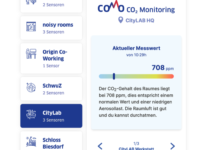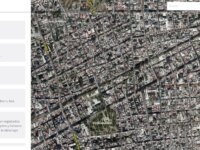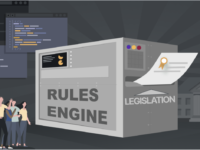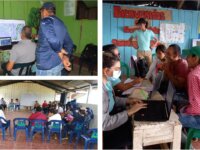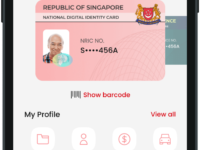In COMo, the CO2 concentration (CO2 = Carbon Dioxide) serves as a measure for indoor air quality and aerosol pollution; the latter correlates with the potential (COVID) viral load. Objective CO2 readings via networked sensors enable operators to control the indoor air quality and thus reduce the risk of infection for visitors. Published data allow visitors to make decisions about visiting the facility.
All content is available under open source licenses (MIT, BSD, Creative Commons).
Innovation Tag: Data
CGR has a great amount of available data that need to be exploited to improve its work, while deepening the digital transformation of the State to improve its quality.
The aim is to enhance data analysis through the use of algorithms to anticipate risks in the fight against corruption, as well as to improve the channels for citizen complaints.
We apply the use of data and technologies in our daily work, thus impacting the State.
Buenos Aires 3D City is an open digital platform that allows three-dimensional visualization of each neighborhood and, specifically, the areas where it is possible to build infrastructure (i.e., housing, commercial and retail buildings, etc.) according to the current city's regulations. The platform is open to district decision-makers and professionals working in the construction industry; it functions as an interdisciplinary work tool to simplify procedures, provide predictability and…
The Australian Government - Dept of Finance sponsored a Proof of Concept (PoC) that looked at how Rules as Code (RaC) might be provided as a shared utility that can be used to deliver simpler, personalised digital user journeys for citizens. RaC is the process of taking legislation and regulations and turning them into machine-readable code. It provides many benefits to citizens and government, including greater reuse, less duplication, greater transparency and accessibility of rules.
Case Study
Driving Artificial Intelligence in Public Services through accredited upskilling and project…
The Foundation Certificate in AI project seeks to make Ireland a world-leader in the ethical application of Artificial Intelligence across the Irish civil and public services by 2030 and is in line with the digital ambition, which the government of Ireland set itself. The project aims to upskill/reskill Irish Civil & Public Servants, identify a pipeline of potential AI projects that can improve service delivery, deliver value for money and is aligned National Strategy in AI & Innovation.
Several land areas in Colombia lack of formal registry and documents as a consequence of the absence of territorial information and the aftermath effects of the armed conflict. Through the intensive use of new technologies and innovative methodologies, the problem of characterization of vacant areas was addressed by using novel methods to consolidate land data and information, benefiting the farmers of the area.
As more services digitalize, there is a need for high assurance digital identity; to empower our citizens to transact digitally by providing them with a convenient and secure digital identity; to digitally enable government and businesses to digitalize their operations and capture new opportunities by providing a series of trust services in the form of APIs; and to create an ecosystem of trust so as to promote trusted data flows. Citizens, government, and businesses have benefited from Singpass.
Customer-oriented public services direct the authorities to look at citizens from their own responsibilities without taking into account a citizen’s overall life situation. A human-centric and life event -based operating model supported with the life-event service ecosystem technology enables the authorities to produce value directly in people's life events through the cooperation of other service providers in a timely and proactive manner.
Democratic Technology brings governments and citizens into the 21st century. It empowers engagement in real time on daily issues, between people and politicians in a seamless and transparent way. Using geolocation or an address entry, real verified users are shown their government representatives on their smartphones enabling direct one-to-one messaging on important events. Collected anonymized data enables evidence based decision making for the public and governments.
The Anti-Corruption Digital Marketplace (MDA) is the first space developed by a public institution in the history of Mexico, in which public institutions can share free and ready-to-use digital tools, in order to streamline and promote innovation and cooperation among those that need either software, or other digital resources to achieve common goals in addressing corruption. The MDA contains more than 22 tools, some of them have been developed by other national or local level public…

